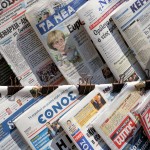Bosnic – an informal leader of the Salafi movement in Bosnia and Herzegovina – is on trial in Sarajevo for inciting terrorism, as well as recruiting and organizing the departure of Bosnian citizens to Syria to fight alongside IS.
Prosecutors have claimed earlier in proceedings that his alleged illicit work included receiving “vast sums“ of money from Arab countries with which to fund young men joining IS.
Previous hearings have also seen analysis of Bosnic's speeches, which the prosecution says are extremist, and the testimony of parents whose sons have reportedly fought in Syria.
A court session on Wednesday saw two witnesses called to testify by lawyer for the defense, Adil Lozo.
Mirhad Durakovic, a 31-year-old mechanic who now works in Slovenia but was born in Bosnic's home village, described the community that regularly prays in Bosnic's house in Brigovi, which is in the northwestern municipality of Buzim.
Durakovic, who wore a long beard and loose pants, entered the courtroom with crutches saying that he had been on sick leave in his home village since 2008 due to a work accident.
He said that when he arrived home that year, he heard a lot about Bosnic and wanted to meet him. He quickly fostered respect for the man who had “studied abroad“ and from whom he could learn about Islam and “how to live a normal and moral life“.
“Bosnic did not gather us,“ said Durakovic, contradicting earlier claims that Bosnic had groomed young and vulnerable men in the community for terrorism.
“We are the ones who asked him to teach us,“ he added.
Durakovic said that, before his death, Bosnic's late father said he would like a mosque or a mesdzid (Islamic school where Muslims can also pray) to be built on his land.
He said the community then pitched in and built a mesdzid in order to separate from the Muslims who prayed at the local mosque, with whom they often clashed over differences in religious practices and interpretations.
“We are all members of the Islamic community,“ said Durakovic, “but we cannot agree on some issues. It is our internal problem.“
Durakovic described to the court the community's activities– prayers, teachings, gatherings, discussions and humanitarian work.
He said the scope of their humanitarian work included buying fertile land and houses for poor members of the community. Between 100,000 and 120,000 Bosnian marks (about US$ 58,000 to US$69,500) was paid by “a foreign Islamic country“ into Bosnic's bank account in 2013 and 2014, according to Durakovic.
He told the court that, with the money, the community bought land and built a house for a married couple who had no home. All of the land and the house are registered under the name of the man from the couple, said Durakovic. The witness said he knew nothing more about the transactions, or the specifics of the foreign source, and did not name the recipient of the house.
The defense also called in Bosnic's neighbor Elvedin Grosic, 36, professor of sociology at local Islamic school Dzemaludin Causevic. Grosic said he attended Bosnic's speeches two or three times a month.
He described Bosnic as “a good neighbor and a man one could count on“, adding that two of Bosnic's children attend the school where he works, and are both well-mannered and good students.
The people attending the gatherings in Bosnic's house, according to Grosic, came from all walks of life, levels of education, and ages. Contrary to the testimony of an expert witness earlier in the trial, Grosic said there was nothing extremist about Bosnic's teachings.
He added that there was no mention of people departing to Syria at the gatherings he attended.
Bosnic denies all charges. His lawyer says the case against Bosnic is an attack on religious freedom and freedom of expression, built on discrimination against Bosnic and his beliefs.






